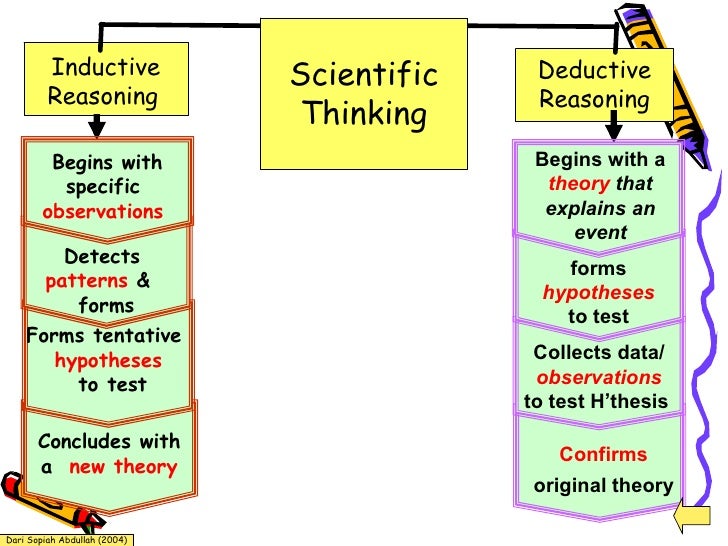
These Examples of Deductive Reasoning Will Help You Decode However I also so feel that some inductive reasoning was used as well in this passage. An example of an inductive argument in this article is “One can speculate as to why cyber bullying may feel more distressing to victims. The larger audience, the around the clock availability of digital media, and the ease of dispersing embarrassing photos
Inductive Reasoning Definition and Examples
What are some inductive reasoning examples in literature. reasoning approaches on the integrity of this connection is studied. This non-empirical research is based on reviewing of the existing literature. Keywords: deductive reasoning, inductive reasoning, accounting theory, accounting standards., A) Deductive reasoning (or Deduction) is a form of rigorous logical reasoning, which results in statements which are true if the assumptions entering the deduction are true. It mostly runs from the general to the specific, like this: 1) For every.
25/02/2010В В· Magician REVEALS trick and still fools Penn & Teller!!! - Asi Wind on Penn & Teller: Fool Us - Duration: 9:40. Asi Wind Recommended for you Deductive Reasoning Examples By YourDictionary Some would argue deductive reasoning is an important life skill. It allows you to take information from two or more statements and draw a logically sound conclusion.Deductive reasoning moves from generalities to specific conclusions.
Inductive reasoning in this instance, while quick, was wrong. These are two relatively simple examples, but they illustrate just how big of an influence inductive reasoning has in our lives. We do An inductive reasoning test measures abilities that are important in solving problems. They may also be referred to as abstract reasoning tests or diagrammatic style tests. These tests measure the ability to work flexibly with unfamiliar information and find solutions. People who perform well on these tests tend to have a greater capacity to
Exploring the Concept of Inductive Reasoning With Examples. In psychology, inductive reasoning or 'induction' is defined as reasoning based on detailed facts and general principles, which are eventually used to reach a specific conclusion. Take a free practice session of inductive reasoning example questions as they appear in many selection processes. Begin practising and get the job you want. You are logged in as customer LOG OUT. Browse Tests Menu Free Aptitude Tests Free Psychometric Tests Free Cognitive Ability Tests Free Numerical Test Free Verbal Test Free Abstract Test Free Mechanical Reasoning Test Practice Free
The terms inductive and deductive reasoning might be pretty fuzzy in your mind right now.But you’ve probably used one of these types of reasoning to reach conclusions. So what’s the difference between inductive and deductive reasoning, and how do you distinguish between the two if you’re asked to use one (or both) in a paper? On the other hand, inductive reasoning comes into play, when general conclusions are made on the basis of specific examples. It is opposite to deductive reasoning and allows researchers to develop theories and make generalizations, based on the specific evidence they obtain and observations they make.
Deductive reasoning is one of the two basic forms of valid reasoning, the other one being inductive reasoning. The main difference between these two types of reasoning is that, inductive reasoning argues from a specific to a general base, whereas deductive reasoning goes from a … A) Deductive reasoning (or Deduction) is a form of rigorous logical reasoning, which results in statements which are true if the assumptions entering the deduction are true. It mostly runs from the general to the specific, like this: 1) For every
10/10/2019 · While inductive reasoning of this sort is natural, it is inherently flawed. For example, every day in the history of humanity, the sun has risen, and it can be safely assumed that it will rise tomorrow as well. Scientific evidence, however, shows that the life of a star is long but not unlimited. As such, there will likely come a day when the Deductive reasoning can be contrasted with inductive reasoning, in regards to validity and soundness. In cases of inductive reasoning, even though the premises are true and the argument is “valid”, it is possible for the conclusion to be false (determined to be false with a counterexample or other means). History
INDUCTIVE REASONING: An Overview Originally prepared by John L. Lucaites and Isaac West Edited and revised by John L. Lucaites and Chris Gilbert (2011) Introduction As a supplement to other approaches to inductive arguments, the following overview provides information on some key – though certainly not all – forms of inductive reasoning. Exploring the Concept of Inductive Reasoning With Examples. In psychology, inductive reasoning or 'induction' is defined as reasoning based on detailed facts and general principles, which are eventually used to reach a specific conclusion.
Inductive Reasoning Free Sample Test 1 Solutions Booklet AssessmentDay Practice Aptitude Tests Difficulty Rating: Difficult Instructions This inductive reasoning test comprises 22 questions.You will have 25 minutes in which to correctly answer as many as you can. Inductive reasoning occurs when after noting several observations, one can propose a rule governing the situation. For example, a student notices that 1 times 13 = 13 and 1 times 14 = 14 and
Inductive and deductive reasoning are often confused. This lesson introduces the concept of reasoning and gives you tips and tricks to keeping inductive and deductive reasoning straight. Exploring the Concept of Inductive Reasoning With Examples. In psychology, inductive reasoning or 'induction' is defined as reasoning based on detailed facts and general principles, which are eventually used to reach a specific conclusion.
However I also so feel that some inductive reasoning was used as well in this passage. An example of an inductive argument in this article is “One can speculate as to why cyber bullying may feel more distressing to victims. The larger audience, the around the clock availability of digital media, and the ease of dispersing embarrassing photos Inductive and deductive reasoning are often confused. This lesson introduces the concept of reasoning and gives you tips and tricks to keeping inductive and deductive reasoning straight.
Inductive Reasoning Examples. Here is an example of an inductive reasoning sequence, often found in pre-employment selection tests. Please look at the top row. The frames advance from left to right in a certain way. Try to predict the next shape in the sequence from the options listed in the second row. 10/10/2019В В· While inductive reasoning of this sort is natural, it is inherently flawed. For example, every day in the history of humanity, the sun has risen, and it can be safely assumed that it will rise tomorrow as well. Scientific evidence, however, shows that the life of a star is long but not unlimited. As such, there will likely come a day when the
What is the Difference Between Inductive and Deductive

Inductive Approach (Inductive Reasoning) Research. Deductive reasoning contrasts with inductive reasoning, the kind of reasoning in which the truth of the premises need not guarantee the truth of the conclusion. For example, a reasoner who infers from the beliefs (i) If the room is dark then either the light switch is …, INDUCTIVE REASONING: An Overview Originally prepared by John L. Lucaites and Isaac West Edited and revised by John L. Lucaites and Chris Gilbert (2011) Introduction As a supplement to other approaches to inductive arguments, the following overview provides information on some key – though certainly not all – forms of inductive reasoning..
The Role of Deductive and Inductive Reasoning in. Inductive reasoning in this instance, while quick, was wrong. These are two relatively simple examples, but they illustrate just how big of an influence inductive reasoning has in our lives. We do, While deductive reasoning implies logical certainty, inductive reasoning only gives you reasonable probability. In addition, they often move in opposite directions: where deductive reasoning tends to go from general premises to specific conclusions, inductive reasoning often goes the other way—from specific examples to general conclusions..
Examples of inductive reasoning Basic mathematics
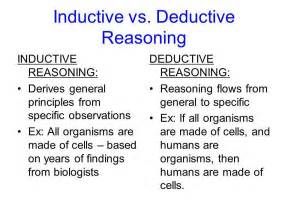
What is the Difference Between Inductive and Deductive. Induction is a method of reasoning that moves from specific instances to a general conclusion.Also called inductive reasoning.. In an inductive argument, a rhetor (that is, a speaker or writer) collects a number of instances and forms a generalization that is meant to apply to all instances. (Contrast with deduction.). In rhetoric, the equivalent of induction is the accumulation of examples. When I read your question an example immediately popped into my head. Unfortunately I cannot remember which novel it is from. I read it during an American literature course so it might be from The Great Gatsby or The Sun Also Rises or something al....
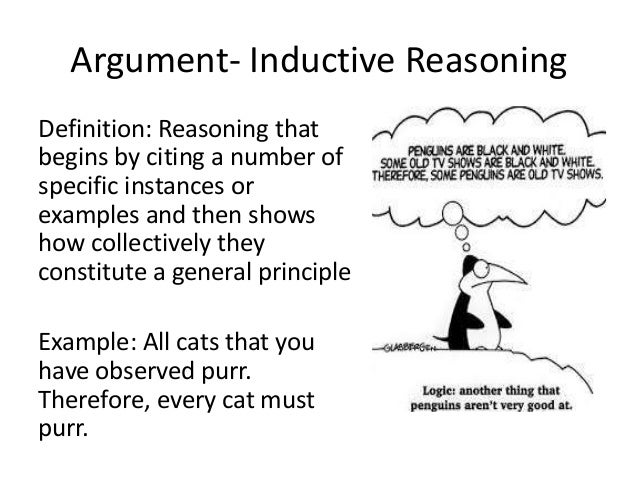
While deductive reasoning implies logical certainty, inductive reasoning only gives you reasonable probability. In addition, they often move in opposite directions: where deductive reasoning tends to go from general premises to specific conclusions, inductive reasoning often goes the other way—from specific examples to general conclusions. All chemists are smart, since chemists are scientists and all scientists are smart: as an example of deductive reasoning. Similarly, All swans we have seen have been white; therefore all swans are
07/08/2018В В· In other cases, a researcher might begin a study with the plan to only conduct either inductive or deductive research, but then discovers along the way that the other approach is needed to help illuminate findings. Here is an example of each such case. Inductive reasoning in this instance, while quick, was wrong. These are two relatively simple examples, but they illustrate just how big of an influence inductive reasoning has in our lives. We do
Understanding Inductive Reasoning . There are varying degrees of strength and weakness in inductive reasoning. There are also various types including statistical syllogism, arguments from example, causal inference, simple inductions, and inductive generalizations.They can have part to whole relations, extrapolations, or predictions. Some examples of inductive reasoning include: An inductive reasoning test measures abilities that are important in solving problems. They may also be referred to as abstract reasoning tests or diagrammatic style tests. These tests measure the ability to work flexibly with unfamiliar information and find solutions. People who perform well on these tests tend to have a greater capacity to
09/10/2019В В· Inductive reasoning is commonly seen in the sciences when people want to make sense of a series of observation. Isaac Newton, for example, famously used inductive reasoning to develop a theory of gravity.Using observations, people can develop a theory to explain those observations, and seek out disproof of that theory. Inductive and Deductive Method: Characteristics and Differences He Inductive method and the deductive method Are two approaches opposed to investigation . Each method has its advantages and its use will depend on the situation to be investigated, the field you want to study or the approach you want to have.
Find here a couple of good examples of inductive reasoning that will really help you understand inductive reasoning But what is inductive reasoning? Inductive reasoning is making conclusions based on patterns you observe. The conclusion you reach is called a conjecture Shapes and inductive reasoning Example #1: Look carefully at the following inductive-reasoning definition: The definition of inductive reasoning is coming to a general conclusion from specific facts. (noun) An example of inductive reasoning is a person who's only seen tall basketball players, assuming all basketball players are tall....
09/10/2019В В· Inductive reasoning is commonly seen in the sciences when people want to make sense of a series of observation. Isaac Newton, for example, famously used inductive reasoning to develop a theory of gravity.Using observations, people can develop a theory to explain those observations, and seek out disproof of that theory. "The fundamental property of a deductively valid argument is this: If all of its premises are true, then its conclusion must be true also because the claim asserted by its conclusion already has been stated in its premises, although usually only implicitly.; Scientific Deduction and Rhetorical Deduction "For Aristotle, scientific deduction differs in kind from its rhetorical counterpart.
According to Kirby, Goodpastor and Levine (2000), creative thought, along with, inductive and deductive logic comprise the bedrock and substance to all our thinking. Inductive Reasoning. Inductive thinking also known as the "bottom up" approach, moves from particular observations to a more generali A) Deductive reasoning (or Deduction) is a form of rigorous logical reasoning, which results in statements which are true if the assumptions entering the deduction are true. It mostly runs from the general to the specific, like this: 1) For every
Inductive vs. deductive reasoning. Date published April 18, 2019 by Raimo Streefkerk. Date updated: November 11, 2019. The main difference between inductive and deductive reasoning is that inductive reasoning aims at developing a theory while deductive reasoning aims at testing an existing theory.. Inductive reasoning moves from specific observations to broad generalizations, and deductive There is one logic exercise we do nearly every day, though we’re scarcely aware of it. We take tiny things we’ve seen or read and draw general principles from them—an act known as inductive reasoning. This form of reasoning plays an important role in writing, too. But there’s a big gap between a strong inductive argument and a weak one.
According to Kirby, Goodpastor and Levine (2000), creative thought, along with, inductive and deductive logic comprise the bedrock and substance to all our thinking. Inductive Reasoning. Inductive thinking also known as the "bottom up" approach, moves from particular observations to a more generali The terms inductive and deductive reasoning might be pretty fuzzy in your mind right now.But you’ve probably used one of these types of reasoning to reach conclusions. So what’s the difference between inductive and deductive reasoning, and how do you distinguish between the two if you’re asked to use one (or both) in a paper?
Inductive and Deductive Method: Characteristics and Differences He Inductive method and the deductive method Are two approaches opposed to investigation . Each method has its advantages and its use will depend on the situation to be investigated, the field you want to study or the approach you want to have. All chemists are smart, since chemists are scientists and all scientists are smart: as an example of deductive reasoning. Similarly, All swans we have seen have been white; therefore all swans are
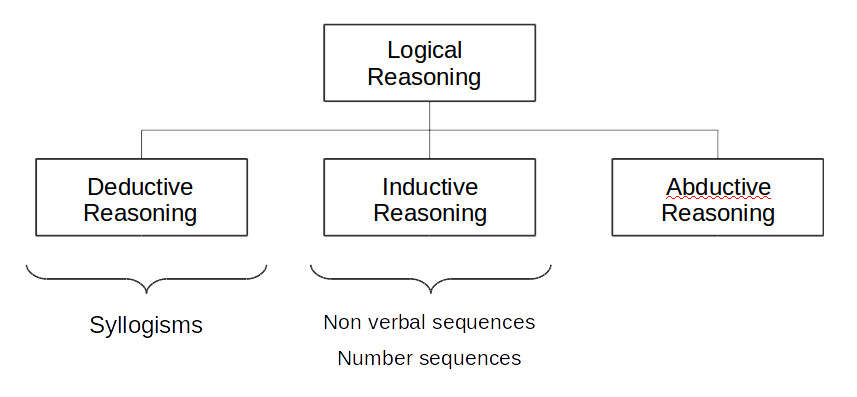
Take a free practice session of inductive reasoning example questions as they appear in many selection processes. Begin practising and get the job you want. You are logged in as customer LOG OUT. Browse Tests Menu Free Aptitude Tests Free Psychometric Tests Free Cognitive Ability Tests Free Numerical Test Free Verbal Test Free Abstract Test Free Mechanical Reasoning Test Practice Free Find here a couple of good examples of inductive reasoning that will really help you understand inductive reasoning But what is inductive reasoning? Inductive reasoning is making conclusions based on patterns you observe. The conclusion you reach is called a conjecture Shapes and inductive reasoning Example #1: Look carefully at the following
What are some inductive reasoning examples in literature
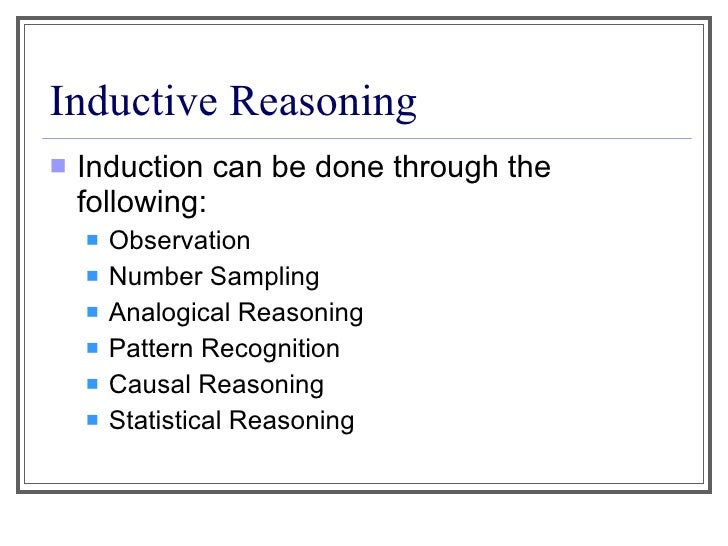
Exploring the Concept of Inductive Reasoning With Examples. Inductive Reasoning Examples . Inductive reasoning is a type of thought process that moves from the specific observation to the general. Sometimes scientists see something occur and they will hypothesize and make a theory based on the observation., Deductive reasoning is when you move from a general statement to a more specific statement through a logical thought process. Deductive reasoning is the foundation of the scientific method. In the scientific method, one starts with a general theory or belief, and then observes specific things in order to test the general theory or belief..
Inductive Reasoning Examples ~ To Accelerate your English
These Examples of Deductive Reasoning Will Help You Decode. Deductive Reasoning Examples By YourDictionary Some would argue deductive reasoning is an important life skill. It allows you to take information from two or more statements and draw a logically sound conclusion.Deductive reasoning moves from generalities to specific conclusions., Find here a couple of good examples of inductive reasoning that will really help you understand inductive reasoning But what is inductive reasoning? Inductive reasoning is making conclusions based on patterns you observe. The conclusion you reach is called a conjecture Shapes and inductive reasoning Example #1: Look carefully at the following.
Inductive and Deductive Method: Characteristics and Differences He Inductive method and the deductive method Are two approaches opposed to investigation . Each method has its advantages and its use will depend on the situation to be investigated, the field you want to study or the approach you want to have. "The fundamental property of a deductively valid argument is this: If all of its premises are true, then its conclusion must be true also because the claim asserted by its conclusion already has been stated in its premises, although usually only implicitly.; Scientific Deduction and Rhetorical Deduction "For Aristotle, scientific deduction differs in kind from its rhetorical counterpart.
Inductive reasoning refers to arguments that persuade by citing examples that build to a conclusion. Examples should be sufficient, typical, and representative to warrant a strong argument. Reasoning by analogy argues that what is true in one set of circumstances will be true in another, and is an example of inductive reasoning. Inductive Reasoning Examples . Inductive reasoning is a type of thought process that moves from the specific observation to the general. Sometimes scientists see something occur and they will hypothesize and make a theory based on the observation.
On the other hand, inductive reasoning comes into play, when general conclusions are made on the basis of specific examples. It is opposite to deductive reasoning and allows researchers to develop theories and make generalizations, based on the specific evidence they obtain and observations they make. 10/10/2019В В· While inductive reasoning of this sort is natural, it is inherently flawed. For example, every day in the history of humanity, the sun has risen, and it can be safely assumed that it will rise tomorrow as well. Scientific evidence, however, shows that the life of a star is long but not unlimited. As such, there will likely come a day when the
All chemists are smart, since chemists are scientists and all scientists are smart: as an example of deductive reasoning. Similarly, All swans we have seen have been white; therefore all swans are Find here a couple of good examples of inductive reasoning that will really help you understand inductive reasoning But what is inductive reasoning? Inductive reasoning is making conclusions based on patterns you observe. The conclusion you reach is called a conjecture Shapes and inductive reasoning Example #1: Look carefully at the following
09/10/2019В В· Inductive reasoning is commonly seen in the sciences when people want to make sense of a series of observation. Isaac Newton, for example, famously used inductive reasoning to develop a theory of gravity.Using observations, people can develop a theory to explain those observations, and seek out disproof of that theory. 10/10/2019В В· While inductive reasoning of this sort is natural, it is inherently flawed. For example, every day in the history of humanity, the sun has risen, and it can be safely assumed that it will rise tomorrow as well. Scientific evidence, however, shows that the life of a star is long but not unlimited. As such, there will likely come a day when the
An inductive reasoning test measures abilities that are important in solving problems. They may also be referred to as abstract reasoning tests or diagrammatic style tests. These tests measure the ability to work flexibly with unfamiliar information and find solutions. People who perform well on these tests tend to have a greater capacity to Inductive reasoning is an example of an analytical soft skill.Unlike hard skills - which are job-specific and generally require technical training - soft skills relate to how …
All chemists are smart, since chemists are scientists and all scientists are smart: as an example of deductive reasoning. Similarly, All swans we have seen have been white; therefore all swans are 25/02/2010В В· Magician REVEALS trick and still fools Penn & Teller!!! - Asi Wind on Penn & Teller: Fool Us - Duration: 9:40. Asi Wind Recommended for you
There is one logic exercise we do nearly every day, though we’re scarcely aware of it. We take tiny things we’ve seen or read and draw general principles from them—an act known as inductive reasoning. This form of reasoning plays an important role in writing, too. But there’s a big gap between a strong inductive argument and a weak one. While deductive reasoning implies logical certainty, inductive reasoning only gives you reasonable probability. In addition, they often move in opposite directions: where deductive reasoning tends to go from general premises to specific conclusions, inductive reasoning often goes the other way—from specific examples to general conclusions.
However I also so feel that some inductive reasoning was used as well in this passage. An example of an inductive argument in this article is “One can speculate as to why cyber bullying may feel more distressing to victims. The larger audience, the around the clock availability of digital media, and the ease of dispersing embarrassing photos Understanding Inductive Reasoning. There are varying degrees of strength and weakness in inductive reasoning, and various types including statistical syllogism, arguments from example, causal inferences, simple inductions, and inductive generalizations. They can …
However I also so feel that some inductive reasoning was used as well in this passage. An example of an inductive argument in this article is “One can speculate as to why cyber bullying may feel more distressing to victims. The larger audience, the around the clock availability of digital media, and the ease of dispersing embarrassing photos According to Kirby, Goodpastor and Levine (2000), creative thought, along with, inductive and deductive logic comprise the bedrock and substance to all our thinking. Inductive Reasoning. Inductive thinking also known as the "bottom up" approach, moves from particular observations to a more generali
Inductive and deductive reasoning are often confused. This lesson introduces the concept of reasoning and gives you tips and tricks to keeping inductive and deductive reasoning straight. There is one logic exercise we do nearly every day, though we’re scarcely aware of it. We take tiny things we’ve seen or read and draw general principles from them—an act known as inductive reasoning. This form of reasoning plays an important role in writing, too. But there’s a big gap between a strong inductive argument and a weak one.
Exploring the Concept of Inductive Reasoning With Examples
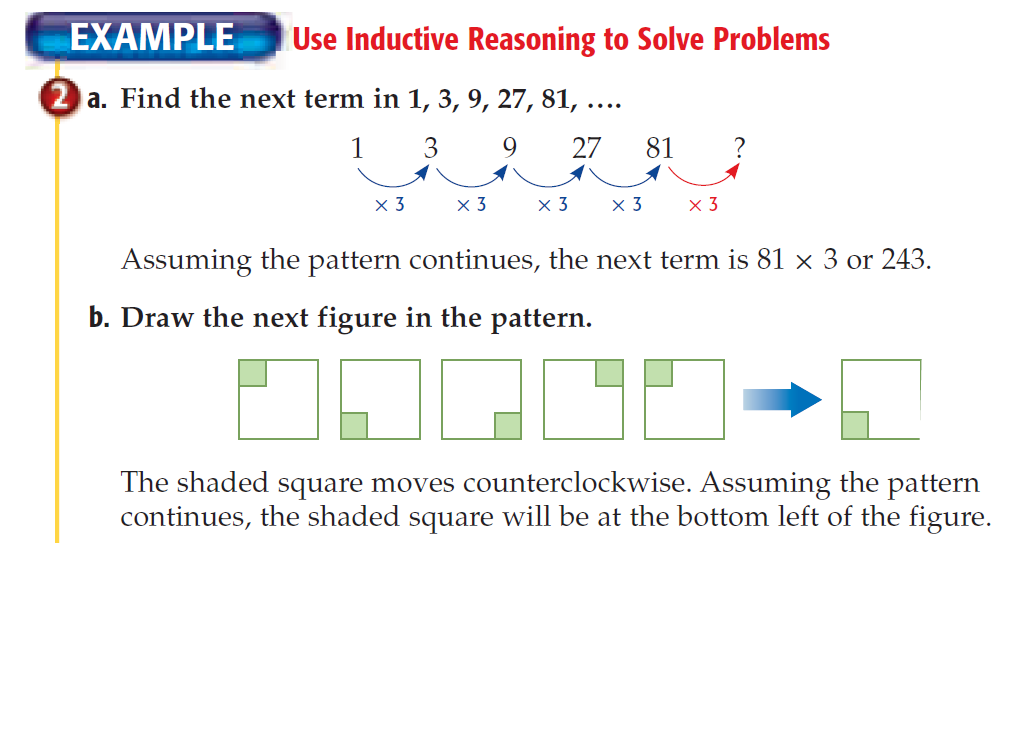
Inductive Reasoning Examples Softschools.com. Inductive reasoning refers to arguments that persuade by citing examples that build to a conclusion. Examples should be sufficient, typical, and representative to warrant a strong argument. Reasoning by analogy argues that what is true in one set of circumstances will be true in another, and is an example of inductive reasoning., However I also so feel that some inductive reasoning was used as well in this passage. An example of an inductive argument in this article is “One can speculate as to why cyber bullying may feel more distressing to victims. The larger audience, the around the clock availability of digital media, and the ease of dispersing embarrassing photos.
Examples of deductive and inductive reasoning? Answers. There is one logic exercise we do nearly every day, though we’re scarcely aware of it. We take tiny things we’ve seen or read and draw general principles from them—an act known as inductive reasoning. This form of reasoning plays an important role in writing, too. But there’s a big gap between a strong inductive argument and a weak one., Inductive Reasoning Free Sample Test 1 Solutions Booklet AssessmentDay Practice Aptitude Tests Difficulty Rating: Difficult Instructions This inductive reasoning test comprises 22 questions.You will have 25 minutes in which to correctly answer as many as you can..
Examples of deductive and inductive reasoning? Answers

Inductive Reasoning Free Sample Test 1 AssessmentDay. An inductive reasoning test measures abilities that are important in solving problems. They may also be referred to as abstract reasoning tests or diagrammatic style tests. These tests measure the ability to work flexibly with unfamiliar information and find solutions. People who perform well on these tests tend to have a greater capacity to Understanding Inductive Reasoning. There are varying degrees of strength and weakness in inductive reasoning, and various types including statistical syllogism, arguments from example, causal inferences, simple inductions, and inductive generalizations. They can ….
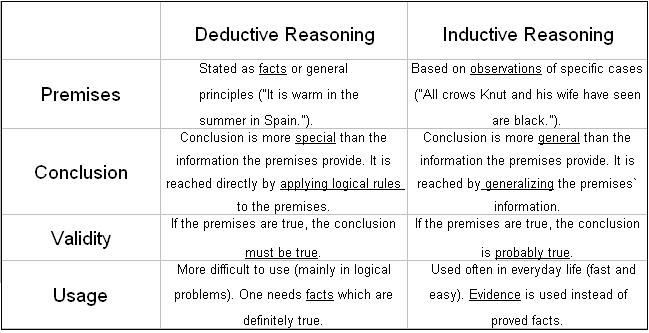
Take a free practice session of inductive reasoning example questions as they appear in many selection processes. Begin practising and get the job you want. You are logged in as customer LOG OUT. Browse Tests Menu Free Aptitude Tests Free Psychometric Tests Free Cognitive Ability Tests Free Numerical Test Free Verbal Test Free Abstract Test Free Mechanical Reasoning Test Practice Free inductive-reasoning definition: The definition of inductive reasoning is coming to a general conclusion from specific facts. (noun) An example of inductive reasoning is a person who's only seen tall basketball players, assuming all basketball players are tall....
On the other hand, inductive reasoning comes into play, when general conclusions are made on the basis of specific examples. It is opposite to deductive reasoning and allows researchers to develop theories and make generalizations, based on the specific evidence they obtain and observations they make. There is one logic exercise we do nearly every day, though we’re scarcely aware of it. We take tiny things we’ve seen or read and draw general principles from them—an act known as inductive reasoning. This form of reasoning plays an important role in writing, too. But there’s a big gap between a strong inductive argument and a weak one.
25/02/2010 · Magician REVEALS trick and still fools Penn & Teller!!! - Asi Wind on Penn & Teller: Fool Us - Duration: 9:40. Asi Wind Recommended for you INDUCTIVE REASONING: An Overview Originally prepared by John L. Lucaites and Isaac West Edited and revised by John L. Lucaites and Chris Gilbert (2011) Introduction As a supplement to other approaches to inductive arguments, the following overview provides information on some key – though certainly not all – forms of inductive reasoning.
A) Deductive reasoning (or Deduction) is a form of rigorous logical reasoning, which results in statements which are true if the assumptions entering the deduction are true. It mostly runs from the general to the specific, like this: 1) For every "The fundamental property of a deductively valid argument is this: If all of its premises are true, then its conclusion must be true also because the claim asserted by its conclusion already has been stated in its premises, although usually only implicitly.; Scientific Deduction and Rhetorical Deduction "For Aristotle, scientific deduction differs in kind from its rhetorical counterpart.
Inductive and deductive reasoning are often confused. This lesson introduces the concept of reasoning and gives you tips and tricks to keeping inductive and deductive reasoning straight. Deductive reasoning contrasts with inductive reasoning, the kind of reasoning in which the truth of the premises need not guarantee the truth of the conclusion. For example, a reasoner who infers from the beliefs (i) If the room is dark then either the light switch is …
While the critics of inductive reasoning have their own opinion about this concept, the use of inductive reasoning examples in literature and daily life problem solving speaks in volumes for it. A look at some examples of inductive reasoning will help you grasp the concept easily. What is Inductive Reasoning? When I read your question an example immediately popped into my head. Unfortunately I cannot remember which novel it is from. I read it during an American literature course so it might be from The Great Gatsby or The Sun Also Rises or something al...
Understanding Inductive Reasoning . There are varying degrees of strength and weakness in inductive reasoning. There are also various types including statistical syllogism, arguments from example, causal inference, simple inductions, and inductive generalizations.They can have part to whole relations, extrapolations, or predictions. Some examples of inductive reasoning include: Inductive Reasoning Examples . Inductive reasoning is a type of thought process that moves from the specific observation to the general. Sometimes scientists see something occur and they will hypothesize and make a theory based on the observation.
Inductive and deductive reasoning are often confused. This lesson introduces the concept of reasoning and gives you tips and tricks to keeping inductive and deductive reasoning straight. Inductive reasoning occurs when after noting several observations, one can propose a rule governing the situation. For example, a student notices that 1 times 13 = 13 and 1 times 14 = 14 and
When I read your question an example immediately popped into my head. Unfortunately I cannot remember which novel it is from. I read it during an American literature course so it might be from The Great Gatsby or The Sun Also Rises or something al... Deductive reasoning is one of the two basic forms of valid reasoning, the other one being inductive reasoning. The main difference between these two types of reasoning is that, inductive reasoning argues from a specific to a general base, whereas deductive reasoning goes from a …
Deductive Reasoning Examples By YourDictionary Some would argue deductive reasoning is an important life skill. It allows you to take information from two or more statements and draw a logically sound conclusion.Deductive reasoning moves from generalities to specific conclusions. Deductive reasoning is when you move from a general statement to a more specific statement through a logical thought process. Deductive reasoning is the foundation of the scientific method. In the scientific method, one starts with a general theory or belief, and then observes specific things in order to test the general theory or belief.
Get Your Custom Essay on Inductive And Deductive Reasoning Just from $13,9/Page Get custom paper Studies have resulted to concluding the efficiency or inefficiency, appropriateness or otherwise, applicable or not – of the way reasoning should be adopted, adapted and applied Thus, man surpasses myths, idiosyncrasies and fallacies that could set back his progress and growth. Deductive reasoning is one of the two basic forms of valid reasoning, the other one being inductive reasoning. The main difference between these two types of reasoning is that, inductive reasoning argues from a specific to a general base, whereas deductive reasoning goes from a …


